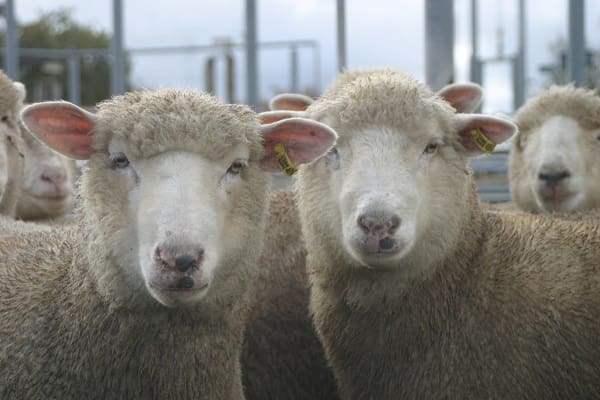STATE farming organisations have flagged they will need more government funding to implement the proposed mandatory national sheep and goat electronic identification system.
However, an Agriculture Ministers’ meeting in Perth on Thursday — that followed an SFO meeting in Adelaide on Wednesday — has not yet yielded a further commitment nor indicated whether the Federal Government will match already announced State Government EID funding in some states.

Lambs with electronic ear tags.
Minister for Agriculture Murray Watt and the state agriculture ministers released the National Agricultural Traceability Strategy 2023-2033 to guide a nationally coordinated approach to enhancing traceability for biosecurity, trade, and food safety outcomes. And Mr Watt’s subsequent communique said the ministers noted that effective traceability is a shared responsibility.
The Adelaide meeting was organised by NSW Farmers with the support of Livestock SA, and included representatives from the Victorian Farmers Federation, AgForce Queensland, Tasmanian Farmers and Graziers Association, WA Farmers and the Pastoralists and Graziers Association of WA to discuss reforms to sheep and goat traceability.
A joint SFO statement said each state was working within different frameworks and had varying levels of support from government, prompting the Adelaide meeting. It was jointly agreed that to achieve a harmonised approach that:
- State and federal governments need to invest increased funding to financially assist producers to transition to individual electronic identification to meet state government implementation requirements. Education for producers should be included in this funding.
- Continued efforts by industry and governments (would be required) to reduce producer costs associated with electronic identification infrastructure and devices.
- (There was a) need for the National Livestock Identification System database to have the required capability and capacity to handle increased data prior to states commencing mandatory electronic identification, and this includes to ensure that the user interface is accessible and usable by producers.
- Support Goat Industry Council of Australia (GICA) recommendations for traceability.
NSW Farmers President Xavier Martin said there was an obvious need for state farm organisations to work together to achieve the best outcomes for the industry.
 “With such a big reform coming through the mandatory implementation of EID traceability for sheep and goats, we need state farm organisations talking and working together to secure the best possible outcomes for their members,” he said.
“With such a big reform coming through the mandatory implementation of EID traceability for sheep and goats, we need state farm organisations talking and working together to secure the best possible outcomes for their members,” he said.
“Each state and territory is at a different place when it comes to EID use and the transition to it being the sole traceability system for sheep and goats, so we came together to see where the common ground was and to collectively take forward the needs of producers from a grassroots level to our national advocacy bodies and governments, both state and federal.
“Since the mandate was announced, we have seen significant increases in costs of production for sheep and goat producers and it is more important than ever that both producers and governments know what it means for their bottom line, and how these mandated changes will impact their operations,” Mr Martin said.
The SFOs said the implementation date agreed by Australia’s Agriculture Ministers of January 1, 2025 was fast approaching, and farmers had been telling their state representative bodies they wanted to see a national system that worked for all participants.
Livestock SA president Joe Keynes said despite first stage funding of $9.3m from the SA Government, more funding was expected post-2025.
“We would like the Federal Government to match that.”
He said SA did not yet know what its share of any Federal Government EID funding would be and he was not aware of any commitment from the Federal Government to match state funding. He said the Adelaide meeting did not calculate what the states collectively believe they will need to implement mandatory EID.
WAFarmers Livestock Council president Geoff Pearson said the issue of matching federal EID funding was raised with Mr Watt in Perth yesterday.
“We’ve got some state funding ($3.4m), but we don’t know about the national funding.
“We as producers have got to work what’s going to be subsidised and what’s not and plan for that.”
But he believed the Federal Government needed to be clear about its funding commitment to allow states and their farmers to plan.
“That’s the golden question at the moment.”
NFF is also waiting for ‘appropriate transition packages’
The National Farmers Federation acknowledged the announcement for a national approach for traceability to benefit a cross section of issues the industry faces in biosecurity, trade and food safety.
NFF vice president David Jochinke said more than ever, traceability systems are an integral scaffold holding up our market access, as well as helping us prevent and act on biosecurity incursions.
“As biosecurity risks and demands for sustainability information continue to grow, traceability is key to making sure Australian grown produce remains safe and competitive.
“However, when traceability initiatives are progressed, appropriate transition packages for each commodity must be provided and we wait to see the detail of this,” he said.

HAVE YOUR SAY